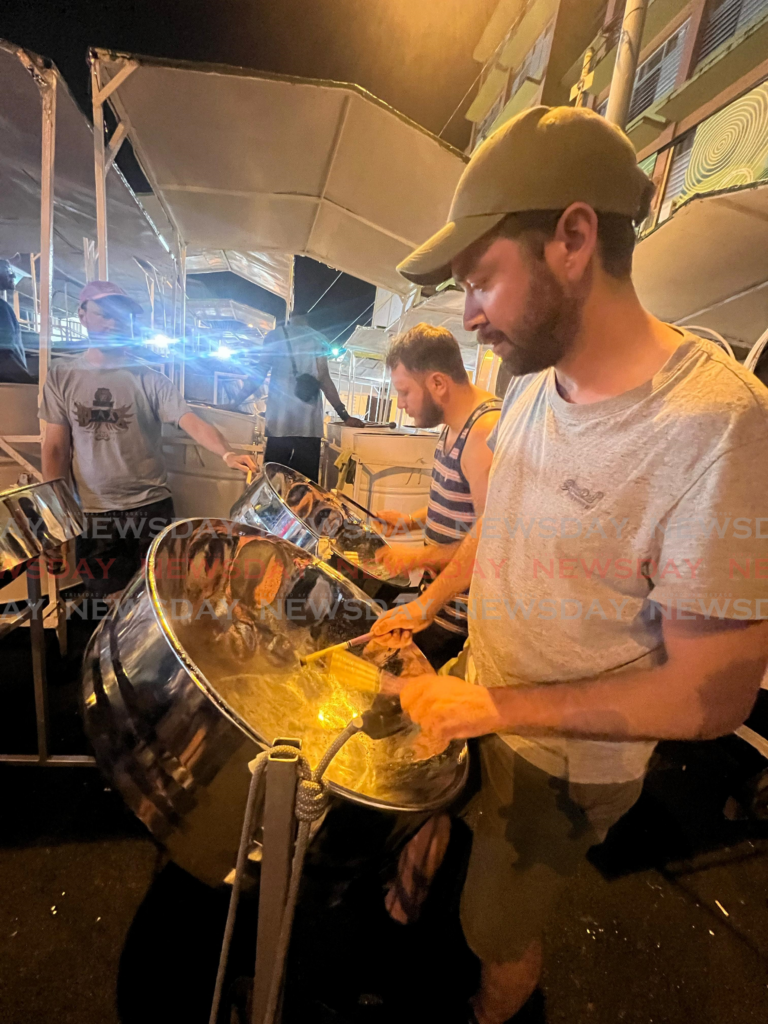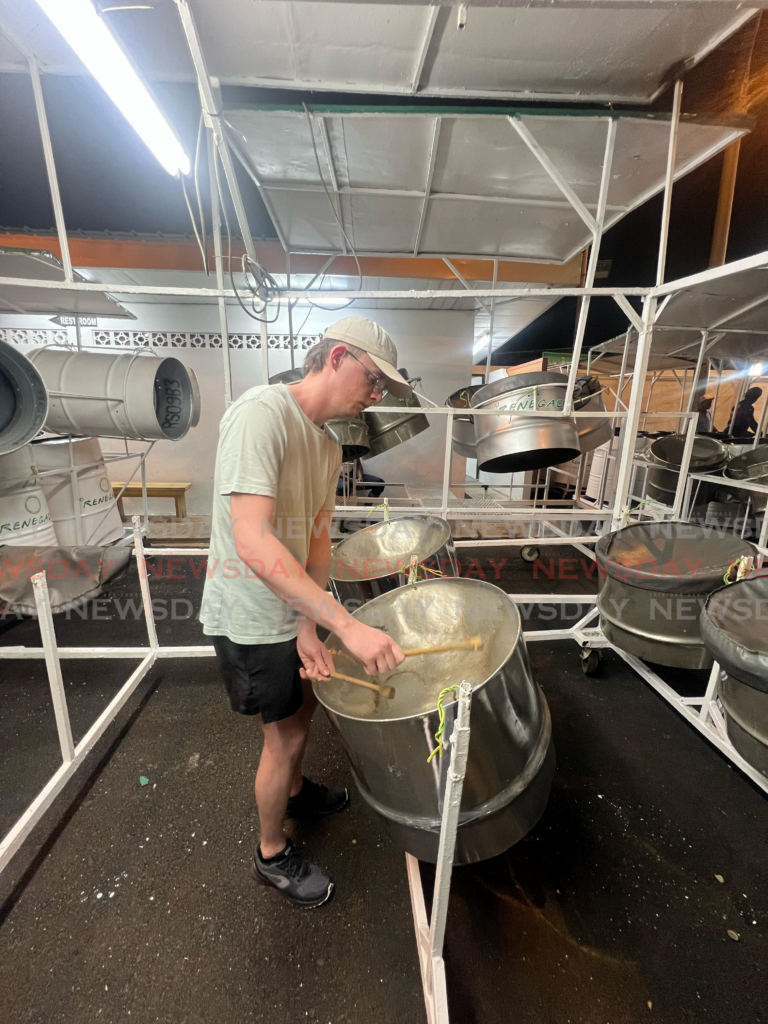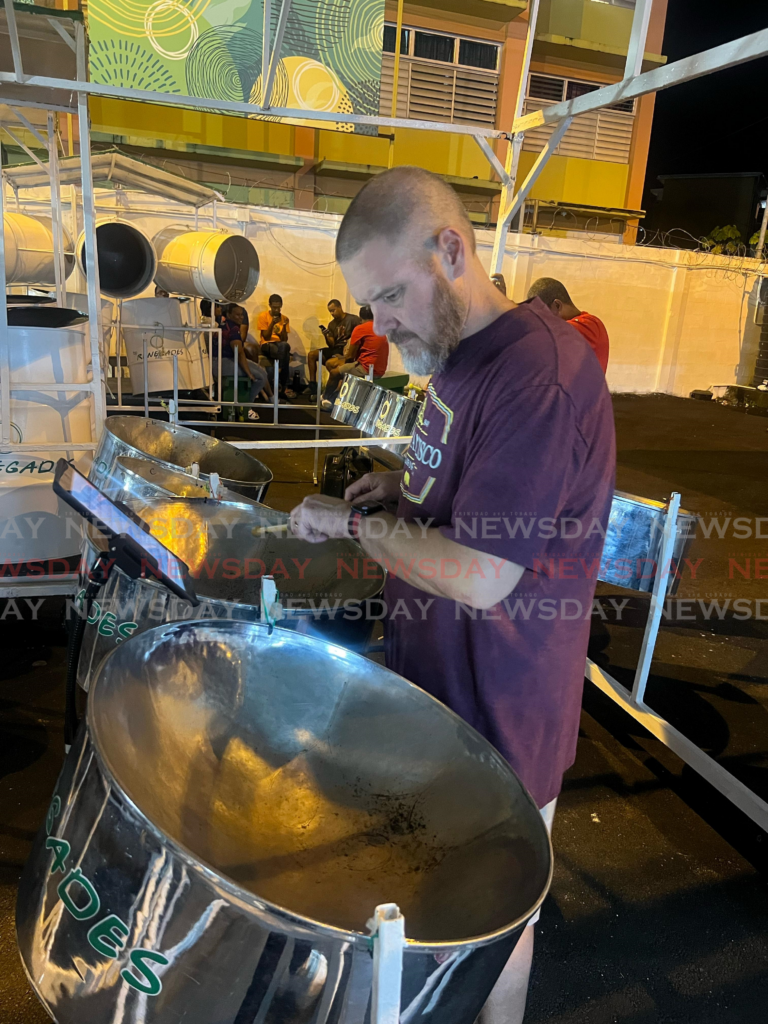Pan tourists soaking up Trinidad and Tobago's culture

Year after year, people from all over the world come to Trinidad and Tobago for Carnival.
While many are drawn to the vibrant festivities, others visit to play the national instrument, the steelpan, and compete in the national Panorama championship.
They will be on stage on February 16 with hundreds of other players during the semifinal rounds for large bands at the Queen's Park Savannah, Port of Spain.
For these visitors, it is about more than just playing pan, but immersing themselves in the country’s unique culture and taking home a piece of TT's heritage to share in their communities.
On February 12, Newsday visited the bp Renegades panyard and was greeted by the melodic sounds of pan.
Newsday traced the source of the sound and discovered six Frenchmen were practising.
Pan connects the world
Robin Lebouvier, 23, said he started playing pan at the age of 11.
"There was a steelband next to my parents' house in France, in a town called Laval. The band is called Les Allumés Du Bidon Steelband (LADB), and my mother forced me to start. I fell in love with the pan and I never stopped."
Lebouvier said this was his first time in Trinidad and he was having an incredible time.
"I have been waiting a long time for this. I am playing guitar pan. This is a dream come true."
Lebouvier said the level of skill needed to play pan was much higher in Trinidad than in France.
Fellow Frenchman Antoine de Kerautem, 32, shared similar sentiments.
"The vibe here is very different. In France; not all the players are very educated. They enjoy it, but that's it.
"In Trinidad, we see that people grow up with the steelpan. It's a real difference. It is amazing!"
He said he has played pan for the last ten years and discovered it through LADB.
"The steelband was near to my house and after many years I had the chance to be in it."
De Kerautem said while this was his first trip to Trinidad, he and the group had talked about coming to TT for a long time.
"It has been really amazing. We wanted to come here to discover the culture of steelbands and to see how Panorama is managed and how it happens."

When asked about the biggest shock so far, he said it was experiencing driving on the "wrong side of the road" (the left side) at which the entire group burst into laughter.
He said he was also pleasantly surprised by Trinidad's musical culture.
"There is music everywhere. In France there is a lot of music, but different.
"You have music in the streets, in bars and cars. What is surprising too is when we drive, we can listen to steelpan on the radio. We cannot do that anywhere else in the world."
Charly Beucher, 31, one of the more experienced pan players in the group, started playing at the age of eight.
"I started playing when LADB was created. I have seen the band grow as it started with five or six people.
"We have 30 people in the band now, and 30 per cent of them are in Trinidad right now."
He spoke about a link he recognised the Frenchmen shared with Trinidad and bp Renegades.
"Twenty years ago Duvone Stewart – bp Renegades arranger – came to France to visit and we learned a song with him.

"It started a new thing for the band. We discovered a lot about the culture of Trinidad and it interested us to this."
After Stewart's visit, Beucher said people in France had an interest in Panorama and would stream the show.
"This year is very important, because the nine members from LADB that are here have the opportunity to grow and learn more things about Trinidad's culture."
Beucher said it was his third visit andhe hoped to explore more of the island this time.
"The first two times we did not have a car. This year we have two cars, so we hope to visit a lot more. We want to go to the Caroni Bird Sanctuary and over to Tobago. After we will ask what else we can do."
Axel Raimbault, 30, another member of the LADB band, started playing pan at 14.
He said it was his second visit to Trinidad, having first played with Renegades in 2020.
"It's a dream come true to play with a big band like Renegades.
"This time I am less stressed compared to 2020 and I am trying to enjoy it a lot more this year."

Jeremy Beucher, 39, the oldest member of the group, was the first to come to Trinidad.
He said he has played steelpan and drums for 25 years.
"I met Duvone in 2006 in France and after that, I came to Trinidad the next year.
"I played with the La Horquetta Pan Groove. I came back with the Renegades in 2019 and now I am back this year. I love this experience."
He said Renegades felt like a home away from home.
"I love the community of the Renegades. It's like a family. It's really different.
"I play many times in London and it's a different experience. With the Renegades, you feel the energy."
He said Stewart was an important piece of LADB's history after he came to France close to ten times.
"We have a really good and close relationship with him. He's like a brother to us."
Vivien Duroy, 22, started playing pan at six, as he was too young to play another instrument.
"I was too young to play the trombone, and school music was in the same place as the panyard."
He said it was a dream to be in playing pan in Trinidad and hopes to visit a pan factory before going home.
Jared Allen, 40, from Palm Coast, Florida, US, also plays with Renegades. He said he learned the steelpan when he started teaching in 2010.
"When I went into the interview they told me I'd be teaching guitar and drumming and steelpan.
"I was like, 'I know absolutely nothing about that,' but I guess I figured it out."
Allen said it was his second time in the country for pan, but lived in Trinidad for a year to do his master's degree at the UTT in Carnival studies.
He said he passes on the knowledge he learns each time he plays in Trinidad.
"Every time I get the chance to play I become a better player and I understand the art form and culture better.
"I always like to take that back to the kids. I spend a lot of time teaching the culture, the history and the background on it. I even make them watch the finals of Panorama.
"We do a lot of credence to Trinidad for giving us the gift of the steelpan."
Concerns for safety
Asked whether crime on the island was a concern, the Frenchmen said they were not too bothered.
"We know there is gang warfare in Trinidad, but they mostly go after each other.
"When you come to the panyard in Trinidad, it's a safe place."
The group, however, follows self-imposed rules to ensure their continued safety.
"We don't go anywhere alone and we make all decisions together.
"We have thought about it for a long time so we had a lot of time to organise."
A state of emergency (SoE) was declared on December 30 last year, after a record-breaking year of murders – 624 – and escalating gang violence.
Nine years ago, between February 9-10, Japanese pannist Asami Nagakiya was strangled to death and her body dumped under a tree at the Queen's Park Savannah. She was still wearing her Carnival costume.
In March 2021, a release from the police said they had killed David Allen, the man they believed was responsible for her death.
The release said Director of Public Prosecutions (DPP) Roger Gaspard “expressed satisfaction that the investigation was thoroughly done” and concluded all the evidence pointed to Allen.
Allen, 31, of Enterprise, Chaguanas, was killed in a police shoot-out on December 12, 2016, in Woodbrook.
Police said Allen posed as a woman, complete with make-up and tight-fitting clothing and tried to rob Stir Fry King Restaurant and Casino Pei Da Xiu, on Ariapita Avenue.
During the robbery, an off-duty policeman confronted him. He was killed while trying to escape.
Nagakiya played with the Trinidad All Stars Steel Orchestra for Panorama 2016.
Newsday also interviewed Koruri Hanat, a Japanese pan player from Trinidad All Stars, who said she knew Nagakiya very well.
Asked about her safety concerns she said, "While I can’t say I have no safety concerns about coming to TT, I’ve learned and practised kiken yosoku – a Japanese risk-anticipation method that focuses on identifying and avoiding potential dangers before they happen.
"By being aware and taking precautions, I do my best to stay safe while continuing to visit."
Hanat has been visiting Trinidad since 2004 and has been playing for 27 years.
"At first, my reason for coming was simple: I wanted to play in Panorama.
"Playing here dramatically improves one’s playing skills and it’s an experience you simply can’t get in Japan."
Hanat keeps coming back to Trinidad, as she is driven by a deep passion to share pan culture with the world.
"As a foreigner, I see steelpan culture from both the outside and the inside, as a foreigner and as a member of Trinidad All Stars."
She hopes one day to become a global ambassador for steelpan.
"I think I’ve always had the desire to spread awareness about pan. In 2006, I helped publish a special magazine featuring the experiences of Japanese players who play with Phase II Pan Groove.
"It was a commercial release, bringing their first-hand Panorama journey to a wider audience."
She has made it her duty to immerse herself fully in the steelpan culture.
"Over the years, I’ve gone beyond just performing. I’ve visited panyards in East and South Trinidad. I've travelled to Tobago every year to watch the medium bands finals and I've met with many tuners, including legends like Ellie Mannette and Guppy Brown.
"These are things most Japanese Panorama players wouldn’t normally do, but I do them because I want to understand steelpan culture as a whole."
Hanat said when her English improves, she hopes to commentate on Panorama broadcasts.

Comments
"Pan tourists soaking up Trinidad and Tobago’s culture"